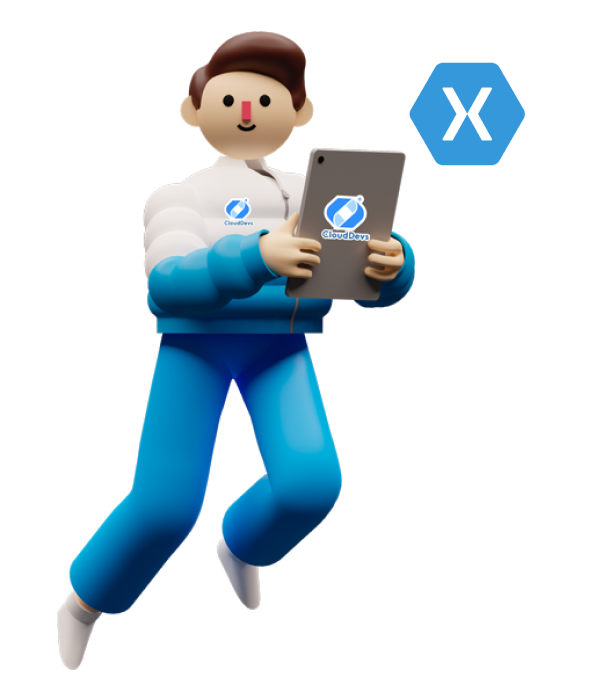Hire Senior Xamarin Developers within 24 Hours
Discover expert Xamarin developers from our meticulously curated talent pool of over 8000 professionals.
At CloudDevs, we offer a streamlined solution to hire top-tier Xamarin talent, granting you access to seasoned developers who align with your local time zone. Build exceptional cross-platform apps with confidence, powered by our dedicated Xamarin experts who bring your visions to life.
With a 7 day risk free trial

Our Xamarin Developers
Our top talents come from world leading companies
Luan
Xamarin Developer Ex-Smart Reporting


Adhemar
Xamarin Developer Ex- PayPal


Sergio
Xamarin Developer Ex-ITSector




Melissa B
Founder


Jason Dong
Co-CEO, Founder

Anthony E
Co-Founder
How to Hire Xamarin Developers
through CloudDevs?
3 easy steps to hire Xamarin developers in 24 hours



What is Xamarin?
Xamarin is a Microsoft-owned platform that allows developers to create cross-platform mobile applications using a single codebase. It enables developers to write their app logic and user interfaces in a single programming language, C#, and then deploy the app to various platforms, such as iOS, Android, and even Windows, with minimal platform-specific code modifications.
Here’s how Xamarin works:
-
Shared Codebase: With Xamarin, you write your application’s core logic, business logic, and data access code in C#. This shared code can be used across multiple platforms.
-
Native UI: Xamarin provides tools and libraries that allow you to create native user interfaces for each platform. This means your app will look and feel like a native app on each platform, enhancing user experience.
-
Platform-Specific Code: While a significant portion of your code is shared, there might still be some platform-specific code required for certain functionalities or UI components that behave differently on different platforms. Xamarin allows you to write these platform-specific code snippets while still keeping most of your codebase shared.
-
API Bindings: Xamarin provides bindings to the native APIs of each platform, allowing you to access device-specific features and functionality.
-
Development Tools: Xamarin integrates with Microsoft Visual Studio, a popular development environment, as well as Visual Studio for Mac and other tools, providing a familiar environment for developers.
Xamarin offers a couple of variations:
-
Xamarin.Forms: This is a UI toolkit that allows you to create user interfaces that can be shared across platforms. It abstracts the native controls into a common set of controls that are rendered natively on each platform. Xamarin.Forms is ideal for simpler apps or for maintaining a consistent UI across platforms.
-
Xamarin.Native: This approach involves using Xamarin to write separate native user interfaces for each platform while sharing the business logic. This provides more control over the user interface’s native look and feel but requires more platform-specific development.
Xamarin simplifies the development of cross-platform applications by reducing the need for completely separate codebases for each platform. This can lead to faster development, easier maintenance, and cost savings for businesses looking to reach a wider audience across multiple mobile platforms.
What are the advantages of using Xamarin for app development?
Xamarin app development offers several significant benefits for developers and businesses looking to create cross-platform mobile applications. Some of the major advantages include:
-
Code Reusability: One of the primary benefits of Xamarin is code reusability. With a shared codebase written in C#, you can reuse a substantial portion of your code across multiple platforms, reducing development time and effort.
-
Native Performance: Xamarin allows you to create native user interfaces and access native APIs for each platform. This results in high-performance apps that closely mimic the performance of fully native applications.
-
Familiar Language: Developers familiar with C# can easily transition to Xamarin development without having to learn a new language. This reduces the learning curve and accelerates the development process.
-
Single Technology Stack: Unlike other cross-platform frameworks that might require knowledge of multiple languages, tools, and frameworks, Xamarin offers a single technology stack. This simplifies development and maintenance.
-
Access to Native APIs: Xamarin provides bindings to platform-specific APIs, enabling you to access device features and functionality unique to each platform. This ensures that your app can take full advantage of the capabilities of iOS and Android devices.
-
Consistent UI/UX: Xamarin.Forms, a part of Xamarin, allows you to create a shared user interface across platforms, maintaining a consistent look and feel. This can be beneficial for apps that prioritize a uniform user experience.
-
Rapid Development: Xamarin’s shared codebase and native performance capabilities can lead to faster development cycles. Changes made to the shared codebase can be quickly reflected on all supported platforms.
-
Tooling and Integration: Xamarin integrates well with popular development environments like Microsoft Visual Studio, providing a familiar and robust set of tools for development, debugging, and testing.
-
Reduced Development Costs: Xamarin can help reduce development costs as it requires writing and maintaining a single codebase for multiple platforms. This is especially beneficial for businesses with limited resources.
-
Community and Support: Xamarin has a supportive community and access to Microsoft’s resources. This means developers can find help, resources, and solutions to common challenges more easily.
-
Enterprise Integration: For businesses invested in the Microsoft ecosystem, Xamarin offers seamless integration with Azure services, making it easier to connect your app to cloud services and databases.
-
Updates and Maintenance: When new platform features or updates are released, Xamarin allows you to incorporate them into your app’s codebase quickly, ensuring your app stays up-to-date with the latest capabilities and security patches.
Is Xamarin worth learning in 2023?
As of 2023, learning Xamarin can still be a valuable investment for developers aiming to create cross-platform mobile applications efficiently. Despite the evolving landscape of mobile app development, Xamarin continues to offer benefits such as code reusability, access to native APIs, and consistent user experiences.
Its integration with Microsoft’s tools and resources, along with a supportive community, provides a strong foundation for developers seeking to build their skills. However, it’s essential to consider the broader context: the rise of other cross-platform frameworks, the emergence of new technologies, and the specific requirements of your projects.
While Xamarin remains a viable option, evaluating it alongside alternatives and considering the nature of your app development goals will help determine if it aligns with your learning objectives and the needs of the industry.
What are the challenges with Xamarin?
Xamarin, while offering numerous advantages, also presents certain challenges that developers should be aware of. One key challenge is the potential complexity of managing platform-specific code. While a significant portion of the codebase can be shared, some features or UI elements might require platform-specific implementations, leading to a more intricate development process.
Additionally, staying up-to-date with the latest changes and updates to iOS and Android platforms can be demanding, as Xamarin needs to incorporate these updates promptly to ensure compatibility and optimal performance. The learning curve for Xamarin can be steeper for those new to C# or unfamiliar with Microsoft’s development ecosystem.
Furthermore, while Xamarin.Forms simplifies UI development, it might not offer the same level of customization and platform-specific UI elements as native development. Lastly, app size can sometimes be larger compared to fully native apps due to Xamarin’s runtime requirements. Despite these challenges, developers who carefully consider the nature of their projects and weigh the trade-offs can still leverage Xamarin effectively to build high-quality cross-platform applications.
Are Xamarin developers high in demand?
Xamarin developers are still in demand, but the demand can vary based on industry trends, technological advancements, and shifts in the mobile app development landscape. Xamarin’s popularity has been driven by its ability to provide a balance between code reusability and native performance, making it an attractive choice for businesses aiming to develop cross-platform mobile applications efficiently.
How do I hire a Xamarin developer?
Hiring a Xamarin developer involves several steps to ensure you find a qualified professional who fits your project’s needs. Here’s a general outline of the process:
-
Define Requirements: Clearly outline your project requirements, including the app’s functionality, platforms (iOS, Android, Windows), and any specific skills you’re seeking in a Xamarin developer.
-
Write a Job Description: Create a comprehensive job description that highlights the required skills, experience level, responsibilities, and any additional qualifications. Be specific about whether you need expertise in Xamarin.Forms, Xamarin.Native, or both.
-
Post the Job: Use job boards, freelancing platforms, company websites, and social media to post your job opening. Provide enough information to attract suitable candidates.
-
Review Resumes and Portfolios: As resumes and portfolios come in, review them to assess the candidates’ Xamarin experience, project history, and overall skill set. Look for examples of Xamarin apps they’ve developed.
-
Conduct Interviews: Select candidates for interviews based on their resumes and portfolios. Conduct technical interviews to assess their Xamarin knowledge, problem-solving abilities, and understanding of mobile app development concepts.
-
Assess Xamarin Knowledge: During interviews, ask questions that test their understanding of Xamarin’s architecture, shared code concepts, platform-specific code, API bindings, and debugging practices.
-
Problem-Solving Exercises: Provide candidates with real-world scenarios or coding challenges related to Xamarin. This can help you evaluate their coding skills, approach to problem-solving, and creativity.
-
Evaluate Communication and Collaboration: Assess candidates’ communication skills and their ability to work within a team, as collaboration is essential in software development.
-
Check References: Contact the references provided by the candidates to gain insights into their work ethic, reliability, and performance on previous projects.
-
Cultural Fit: Consider how well the candidate aligns with your company culture and values. This can impact their long-term success within your team.
-
Negotiate Compensation: Once you’ve identified a suitable candidate, discuss compensation, benefits, and other relevant terms. Ensure that both parties are in agreement.
-
Trial Period: If possible, consider starting with a trial period or a smaller project to assess the developer’s capabilities and fit within your team.
-
Legal and Administrative Steps: If you’re hiring a full-time employee, ensure all necessary legal and administrative steps are taken, such as drafting an employment contract or agreement.
-
Onboarding: Provide the developer with the necessary resources, access to tools, and information to get them started smoothly on the project.
Remember that in addition to technical skills, soft skills like communication, problem-solving, and teamwork are crucial for a successful working relationship. Taking your time to thoroughly evaluate candidates will increase the likelihood of hiring a Xamarin developer who can contribute effectively to your project’s success. For more in-depth information on hiring Xamarin developers visit our Xamarin Developer Hiring Guide here.
Is Xamarin Native or Hybrid?
Xamarin is a framework that supports both native and hybrid approaches to mobile app development, depending on how it’s utilized:
-
Xamarin.Native (Native Approach): Xamarin.Native allows developers to create fully native apps for each platform (iOS, Android, Windows) using C#. This involves writing platform-specific code, user interfaces, and accessing native APIs directly. The result is apps that perform and look like native apps because they are developed using the platform’s native tools and languages. While Xamarin.Native provides the benefits of native performance and access to all platform-specific features, it may require more platform-specific development effort compared to other approaches.
-
Xamarin.Forms (Hybrid Approach): Xamarin.Forms is a UI toolkit within Xamarin that enables developers to create shared user interfaces across platforms using a single codebase. This approach is more hybrid-like because it abstracts the native controls into a common set of controls that are rendered natively on each platform. While Xamarin.Forms simplifies UI development and accelerates cross-platform app creation, it might not offer the same level of customization and platform-specific UI elements as fully native development.
Hence, Xamarin can be used to implement both native and hybrid approaches, allowing developers to choose the best strategy based on their project’s requirements and priorities.
What’s the cost of hiring Xamarin developers?
The hourly rate for a Xamarin developer can vary significantly based on factors such as their experience, location, the complexity of the project, and the specific skills required. As of my last update in September 2021, here’s a general overview of the hourly rates you might encounter for Xamarin developers:
-
Entry-Level Developers: Junior Xamarin developers with limited experience might charge around $20 to $40 per hour.
-
Mid-Level Developers: Xamarin developers with a few years of experience and a solid portfolio could charge between $40 and $80 per hour.
-
Senior-Level Developers: Highly skilled and experienced Xamarin developers, including those with expertise in Xamarin.Native and Xamarin.Forms, might command rates ranging from $80 to $150 or more per hour.
-
Freelancers vs. Agencies: Freelancers may have slightly lower rates compared to development agencies due to lower overhead costs.
-
Geographical Location: Rates can also vary significantly depending on the developer’s geographical location. Developers from regions with a lower cost of living may charge less than those from more expensive areas.
It’s important to note that these rates are rough estimates and can vary. Always conduct market research to get an accurate understanding of the current rates in your specific market. Additionally, consider the developer’s skill level, portfolio, and ability to meet your project’s requirements when making your decision.
Table of Contents
Xamarin FAQs
Yes, Xamarin offers a free version called Xamarin Community Edition, which includes most of the essential features for developing cross-platform applications. However, there’s also Xamarin.iOS and Xamarin.Android included in Visual Studio, which are licensed separately and may require payment for specific features or capabilities.
While Xamarin is primarily designed for mobile app development, including business apps, utilities, and other applications, it is not typically used for game development. For game development, you might consider other game-focused frameworks or engines like Unity or Unreal Engine.
Xamarin Test Cloud, now a part of Microsoft’s Visual Studio App Center, is a cloud-based service that allows you to test your Xamarin applications on a large number of real devices. It helps you ensure that your app works correctly on various devices and platforms, reducing the risk of bugs and compatibility issues.
Yes, Xamarin supports migrating existing native apps to its framework. Xamarin provides tools and documentation to assist in the migration process, allowing you to reuse your existing code and gradually transition to Xamarin’s shared codebase.
Xamarin can be a good choice for startups, especially if your team is already familiar with C# or the Microsoft ecosystem. It can save time and development effort by allowing you to write code once for multiple platforms. However, startups should also consider factors like project complexity, time-to-market, and resource availability before choosing a development framework.
Unleash the Power of Xamarin with Our Expert Developers!
Connect with the perfect Xamarin developer from our elite talent pool of 8000+ pros in under 24 hours. Transform your ideas into innovative, cross-platform apps with top-tier expertise. Tell us your needs – we'll handle the rest!








